Unit 3 英美文学与电影(Charles Dickens)
- 格式:ppt
- 大小:81.50 KB
- 文档页数:14
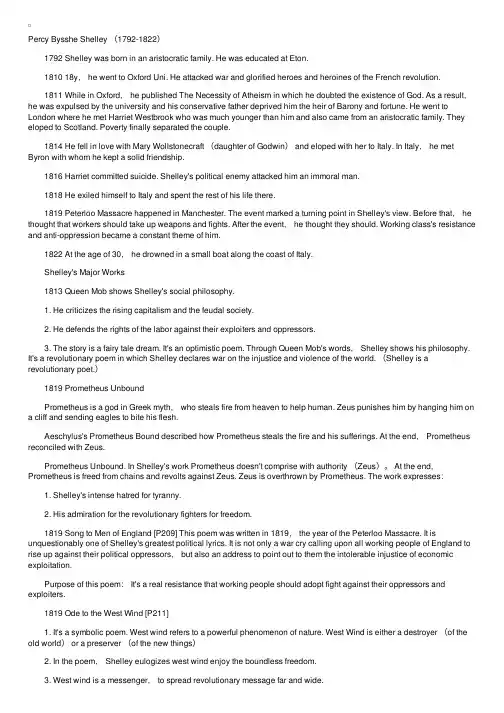
Percy Bysshe Shelley (1792-1822) 1792 Shelley was born in an aristocratic family. He was educated at Eton. 1810 18y, he went to Oxford Uni. He attacked war and glorified heroes and heroines of the French revolution. 1811 While in Oxford, he published The Necessity of Atheism in which he doubted the existence of God. As a result,he was expulsed by the university and his conservative father deprived him the heir of Barony and fortune. He went to London where he met Harriet Westbrook who was much younger than him and also came from an aristocratic family. They eloped to Scotland. Poverty finally separated the couple. 1814 He fell in love with Mary Wollstonecraft (daughter of Godwin) and eloped with her to Italy. In Italy, he met Byron with whom he kept a solid friendship. 1816 Harriet committed suicide. Shelley's political enemy attacked him an immoral man. 1818 He exiled himself to Italy and spent the rest of his life there. 1819 Peterloo Massacre happened in Manchester. The event marked a turning point in Shelley's view. Before that, he thought that workers should take up weapons and fights. After the event, he thought they should. Working class's resistance and anti-oppression became a constant theme of him. 1822 At the age of 30, he drowned in a small boat along the coast of Italy. Shelley's Major Works 1813 Queen Mob shows Shelley's social philosophy. 1. He criticizes the rising capitalism and the feudal society. 2. He defends the rights of the labor against their exploiters and oppressors. 3. The story is a fairy tale dream. It's an optimistic poem. Through Queen Mob's words, Shelley shows his philosophy. It's a revolutionary poem in which Shelley declares war on the injustice and violence of the world. (Shelley is a revolutionary poet.) 1819 Prometheus Unbound Prometheus is a god in Greek myth, who steals fire from heaven to help human. Zeus punishes him by hanging him on a cliff and sending eagles to bite his flesh. Aeschylus's Prometheus Bound described how Prometheus steals the fire and his sufferings. At the end, Prometheus reconciled with Zeus. Prometheus Unbound. In Shelley's work Prometheus doesn't comprise with authority (Zeus)。

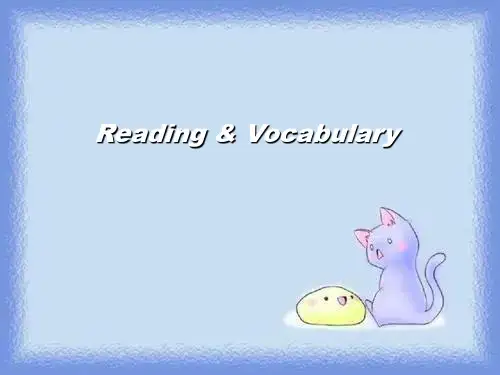
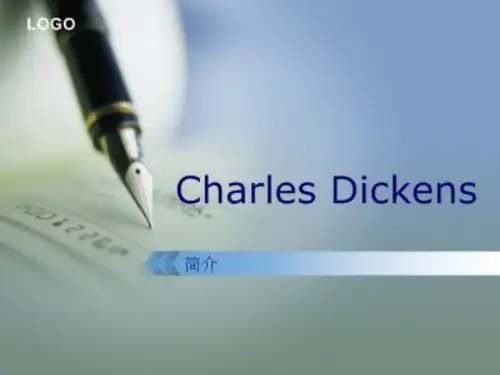
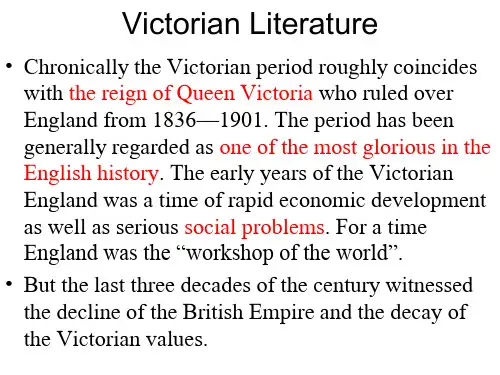
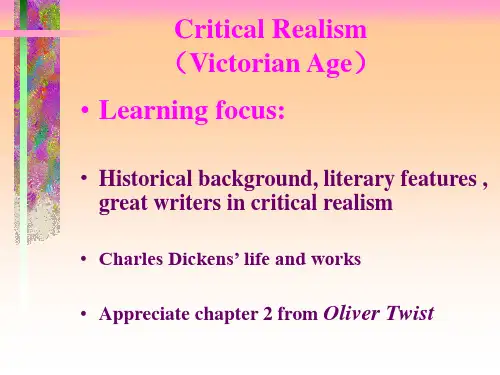
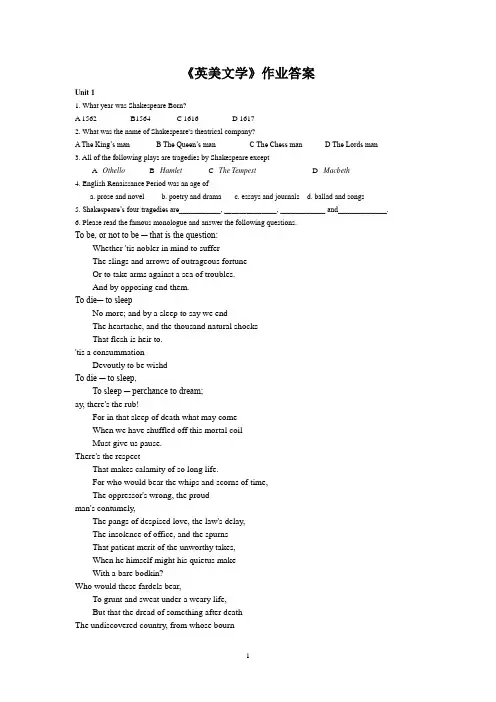
《英美文学》作业答案Unit 11. What year was Shakespeare Born?A 1562 B1564 C 1616 D 16172. What was the name of Shakespeare's theatrical company?A The King’s manB The Queen’s manC The Chess manD The Lords man3. All of the following plays are tragedies by Shakespeare exceptA OthelloB HamletC The TempestD Macbeth4. English Renaissance Period was an age ofa. prose and novelb. poetry and dramac. essays and journalsd. ballad and songs5. Shakespeare’s four tragedies are___________, ______________, ____________ and_____________.6. Please read the famous monologue and answer the following questions.To be, or not to be ─ that is the question:Whether 'tis nobler in mind to sufferThe slings and arrows of outrageous fortuneOr to take arms against a sea of troubles.And by opposing end them.To die─ to sleepNo more; and by a sleep to say we endThe heartache, and the thousand natural shocksThat flesh is heir to.'tis a consummationDevoutly to be wishdTo die ─ to sleep,To sleep ─ perchance to dream;ay, there's the rub!For in that sleep of death what may comeWhen we have shuffled off this mortal coilMust give us pause.There's the respectThat makes calamity of so long life.For who would bear the whips and scorns of time,The oppressor's wrong, the proudman's contumely,The pangs of despised love, the law's delay,The insolence of office, and the spurnsThat patient merit of the unworthy takes,When he himself might his quietus makeWith a bare bodkin?Who would these fardels bear,To grunt and sweat under a weary life,But that the dread of something after deathThe undiscovered country, from whose bournNo traveler returns ─ puzzles the will,And makes us rather bear those ills we haveThan fly to others that we know not of?Thus conscience does make cowards of us all,And thus the native hue of resolutionIs sicklied o’ er with the pale cast of thought,And enterprises of great pith and momentWith this regard their currents turn awryAnd lose the name of action.1.Which famous play is the speech taken from? Who is the author of the play?2.Who gives the speech in the play?3.What does the speech indicate?4.What is the story of the play?7. Explain the term “Renaissance”.Answer1. B2. D3. C4.B5. Hamlet, Othello, King Lear and Macbeth6 1). Hamlet; William Shakespeare2) the main character of the play- Hamlet3) “to be or not to be” indicates to live or end one’s life. The whole drift of the speech shows his belief in a future life. This speech shows Hamlet’s melancholy and his delay and describes he faced the dilemma of action and mind.4). (见书本P6)7.The term Renaissance refers to a great bourgeois cultural movement in Europe which began in the 14th century and continued to the mid-17th century. It first started from Italy and then spread al l over Europe. Originally, the term means “rebirth” or “revival”. And the movement seems to be a rebirth or revival of ancient Greek and Roman culture, caused by a series of historical events, such as the new discoveries in geography and astrology, the religious reformation and the economic expansion.Unit 21.Please summarize the story of Robinson Crusoe.2.What does the image of Robinson Crusoe represent?3.What are the features of Daniel Defoe’s fictions?4.___is considered the father of the English novel.A. DefoeB. FieldingC. RichardsonD. GoldsmithAnswer1. The story was based on the experience of a Scottish Sailor named Alexander Selkirk who had been marooned ona desert island off the coast of Chile and lived there in solitude for four or five years. After his return to Europe, his adventures became known. Defoe wrote this novel in the first person singular.This novel begins with Crusoe’s career as a sailor and a merchant, and then as a plantation owner and a slave trader. On a voyage to Africa to buy slaves he meets with the most unfortunate shipwreck. Then he finds himself cast by the sea waves upon the shore of an uninhabited island. He has to state there alone and manage the livelihood for himself. First of all, he gets back some food and clothes, a few guns and some ammunition from the wretched ship. He builds a shelter to protect himself. Then he grows barley and rice, domesticated goats and fight against cannibal savages coming from the neighboring islands, later he saves a savage from death and named him Friday, who becomes his faithful servant. In the hope of returning to Europe, he builds a boat. Finally an English ship comes and takes him back. Thus Robinson Crusoe ends his twenty-eight years’life in the deserted island. 2. In this novel, Defoe created the image of a true empire-builder, a colonizer and a foreign trader, who has the courage and will to face hardships, and who has determination to preserve himself and improve his livelihood by struggling against nature. There is also a glorification of labor, which enables the hero gradually to produce a favorable condition for himself. His resourcefulness in building a home, dairy, grape arbor, country house, and goat stable from practically nothing is clearly remarkable, which is applauded by Swiss philosopher Jean-Jacques Rousseau. This image is a criticism of the lazy and parasitic feudal nobles and a praise of the bourgeois.3. Though most of his works are written in the picaresque tradition, Defoe is an anti-romantic, anti-feudal realistic writer. His stories are all real concerns of his time: people in their struggle to overcome the natural or social environment. All his works have a very strong verisimilitude. To convince the reader of the truth of his stories, Defoe adopted the autobiographical form and made full use of his long trained journalistic skill by describing things in great detail and by using specific time and space. The following excerpt shows how Robinson makes a raft with concrete descriptionDefoe’s style is characterized by a plain, smooth, easy, direct, and almost colloquial but never coarse language. His words are much closer to the vernacular of rambling sentences without strong pauses to give his style an urgent, immediate, breathless quality, but the units of meaning are small and clear with frequent repetition so that the writing gives an impression of simple lucidity. In his novels, as in his own life, actions or people in action are stressed; there is not much plot or portrayal of characters, except the exact journalistic account of the daily, trivial happenings. In all, Defoe is not an artist, but he is definitely an excellent storyteller. He is the first important novelist in English literary history with his realistic views on novel writing that has influenced many generations.4. AUnit 3 & 41. Romantic age is the age of the following statements exceptA humanitarian idealismB radical individualismC age of reasonD age of imagination2. Lake poets are the following poets exceptA KeatsB WordsworthC ColeridgeD Southey3. Although lived in a remote rural country in Scotland, he is the real forefather of English Romanticism, he isA. BurnsB. KeatsC. ByronD. Shelly4. William Wordsworth wrote a preface expounding his theories of what made good poetry. These theories contain the following principles except:A. All good poems should be “the spontaneous overflow feeling.”B. The poems should be the reflection of feelings, thoughts, and experiences of the other people.C. Poetry should be in high degree of imagination.D. Poetry should “takes all its origin from emotion recollected in tranquility.”5._____defines the poet as "man speaking to men," and poetry as "the spontaneous overflow of powerful feelings, which originates in emotion recollected in tranquility."A. William BlakeB. William WordsworthC. Samuel Taylor ColeridgeD. John Keats6._____is regarded as a "worship of nature".A. John KeatsB. William BlakeC. William WordsworthD. Jane Austen7.Wordsworth’s short poems can be classified in to two groups: poems about nature and poems about________.A. loveB. human lifeC. freedomD. social activities8. Answer the questions concerned with William Wordsworth’s I wondered lonely as a cloud.1)In what sense are “cloud” and “ I” comparable?2)Why does the poet repeat “ dance” for several times?3)What does the shift of tense suggest?Answer1-5 B A A B B 6-7 C B8.1) we are joyful. We both move and express ourselves freely.2) It suggests the harmony between man and nature.3) the tense shifts from past to present and then to future. It suggests the poetic process fromnature to imagination and then to poetic production.Unit 5 & 61. In Pride and Prejudice, Elizabeth Bennet finds out some weak points about herself in the process of judging others. Which of the following is NOT a weak point of hers?A. Blindness.B. Partiality.C. Snobbishness.D. Prejudice.2. In the conversation with his wife in Chapter One of Pride and Prejudice, Mr. Bennet uses a(n) ______ tone with sarcastic humor.A. solemnB. harshC. arrogantD. teasing3. Choose the one from the four immortal odes which is not written by Keats . __________A. Ode to the West WindB. Ode to a NightingaleC. Ode to AutumnD. Ode on a Grecian UrnAnswer CDAUnit 7 &81. As a literary figure, John Rivers appears in _______.A. Fielding’s Tom JonesB. Dickens’s Oliver TwistC. Bronte’s Jane EyreD. Austen’s Pride and Prejudice2. This novel is autobiographical to some extent, because it is known to embody many of the early experiences ofDickens, although it is not an exact autobiography, it isA. Oliver TwistB. Great ExpectationsC. David CopperfieldD. Bleak House3. The most distinguishing feature of Charles Dickens’s works lies in his ______.A. social criticismB. optimismC. character-portrayalD. social setting4. The author of the work “Dombey and Son” is _________.A. Charles DickensB. Henry JamesC. Robert Lee FrostD. Ezra Pound5. Pip, Estella, Havisham, Magwitch, and Joe Gargery are most likely names of characters in_______.A. Oliver TwistB. David CopperfieldC. Bleak HouseD. Great Expectations6. Charles Dickens takes the French Revolution as the background of his novel ______.A. Great ExpectationsB. A Tale of Two CitiesC. Bleak HouseD. Oliver TwistDecide whether the following statements are true or false and write your answers (F or T) in the brackets.1. The greatest English critical realist is Charles Dickens .( )2. Both Charlotte Bronte and her sister Emily Bronte were well knownnovelists.( )3. Jane Austen is one of the male novelists who drew vivid and realistic pictures of everyday life of the country society in her novels .( )4. Jane Austen’s masterpiece is Pride and Prejudice .( )Analyze the characters:David CopperfieldAnswerC C C A B B TTFTDavid Copperfield David Copperfield narrates his story as an adult yet relays the impressions he had from a youthful point of view. Readers can see how David’s perception of the w orld deepens as he comes of age. David, for instance, is ignorant of Steerforth’s treachery at the beginning, but later readers can feel that David does not think Steerforth deserves David’s adulation. Though David always keeps the virtue of honesty, kindliness, and so on, which are considered as good virtues of human beings, he also has moments of cruelty, like the scene in which he intentionally distresses Mr. Dick by explaining Miss Betsey’s dire situation to him. David, especially as a young man in love, can be foolish and romantic. As he grows up, however, he develops a more mature point of view and searches for a lover who will challenge him and help him grow. David fully matures as an adult when he expressesthe sentiment that he values Agnes’s calm tranquility over all else in his life. In a word, in David’s first-person narration, Dickens conveys the wisdom of the older man’s implicitly through the eyes of a child.Unit 9Unit 111. I n Hawthorne’s novels and short stories, intellectuals usually a ppear as________.A. saviorsB. villainsC. commentatorsD. observers2. All of the following are works by Nathaniel Hawthorne except_______.A. The House of the Seven GablesB. White JacketC. The Marble FaunD. The Blithedale RomanceThe Transcendentalists believe that, first, nature is ennobling, and second, the individual is____, therefore, self-reliant.A. insignificantB. vicious by natureC. divineD. forward-lookingAnswer B B CUnit 14______is considered by H.L. Mencken as "the true father of our national literature."A. HemingwayB. PoeC. IrvingD. TwainMark Twain wrote most of his literary works with a _______language.A. grandB. pompousC. simpleD. vernacularAnswer D DUnit 15As a naturalist writer, Theodore Dreiser was greatly influenced by _______.A. Nathaniel HawthorneB. Charles DarwinC. Henry JamesD. Ralph Waldo EmersonThe following belong to “The Lost Generation” except _______.A. Ezra PoundB. Robert FrostC. Theodore DreiserD. William Carlos WilliamsAnswer BC。

英美文学流派与作家知识点整理英美文学源远流长,在其发展历程中涌现出了众多的文学流派和杰出作家,这些流派和作家的作品不仅反映了当时的社会、文化和历史背景,也展现了人类思想和情感的丰富多样性。
以下是对一些重要的英美文学流派与作家的知识点整理。
一、浪漫主义文学浪漫主义文学兴起于 18 世纪末至 19 世纪初,强调个人情感、想象力和自然的重要性。
(一)英国浪漫主义作家1、威廉·华兹华斯(William Wordsworth)他是英国浪漫主义诗歌的先驱之一,其作品强调对自然的热爱和对普通人生活的关注。
代表作有《抒情歌谣集》(Lyrical Ballads)。
2、塞缪尔·泰勒·柯勒律治(Samuel Taylor Coleridge)他的诗作充满奇幻的想象和神秘的元素,《古舟子咏》(The Rime of the Ancient Mariner)是其经典之作。
3、乔治·戈登·拜伦(George Gordon Byron)拜伦以其奔放的激情和叛逆的精神著称,作品有《唐璜》(Don Juan)等。
4、珀西·比希·雪莱(Percy Bysshe Shelley)雪莱的诗歌富有理想主义和革命精神,《西风颂》(Ode to theWest Wind)广为流传。
(二)美国浪漫主义作家1、华盛顿·欧文(Washington Irving)他的作品具有浓厚的地方色彩和幽默风格,《瑞普·凡·温克尔》(Rip Van Winkle)是其代表作。
2、詹姆斯·费尼莫·库珀(James Fenimore Cooper)以描写边疆生活和印第安人而闻名,《皮袜子故事集》(The Leatherstocking Tales)是其重要作品。
二、现实主义文学现实主义文学在 19 世纪中叶兴起,注重真实地反映社会现实和生活。
(一)英国现实主义作家1、查尔斯·狄更斯(Charles Dickens)狄更斯的作品生动描绘了英国社会底层人民的生活,如《雾都孤儿》(Oliver Twist)、《大卫·科波菲尔》(David Copperfield)。
![英美文学-中英文对比[整理版]](https://uimg.taocdn.com/fb8726d088eb172ded630b1c59eef8c75fbf9594.webp)
British Writers and WorksThe Anglo-Saxon Period●The Venerable Bede 比得673~735⏹Ecclesiastical History of the English People 英吉利人教会史●Alfred the Great 阿尔弗雷得大帝849~899⏹The Anglo-Saxon Chronicle 盎格鲁—萨克逊编年史The Late Medieval Ages●William Langland 威廉·兰格伦1332~1400⏹Piers the Plowman 农夫比埃斯的梦●Geoffery Chaucer 杰弗里·乔叟1340(?)~1400⏹The Books of the Duchess悼公爵夫人⏹Troilus and Criseyde特罗伊拉斯和克莱希德⏹The Canterbury Tales坎特伯雷故事集⏹The House of Fame声誉之宫●Sir Thomas Malory托马斯·马洛里爵士1405~1471⏹Le Morte D’Arthur亚瑟王之死The Renaissance●Sir Philip Sydney菲利普·锡德尼爵士1554~1586⏹The School of Abuse诲淫的学校⏹Defense of Poesy诗辩●Edmund Spenser埃德蒙·斯宾塞1552~1599⏹The Shepherds Calendar牧人日历⏹Amoretti爱情小唱⏹Epithalamion婚后曲⏹Colin Clouts Come Home Againe柯林·克劳特回来了⏹Foure Hymnes四首赞美歌⏹The Faerie Queene仙后●Thomas More托马斯·莫尔1478~1535⏹Utopia乌托邦●Francis Bacon弗兰西斯·培根1561~1626⏹Advancement of Learning学术的推进⏹Novum Organum新工具⏹Essays随笔●Christopher Marlowe柯里斯托弗·马洛1564~1595⏹Tamburlaine帖木耳大帝⏹The Jew of Malta马耳他的犹太人⏹The Tragical History of Doctor Faustus浮士德博士的悲剧●William Shakespeare威廉·莎士比亚1564~1616⏹Romeo and Juliet罗密欧与朱利叶⏹Merchant of Venice威尼斯商人⏹Henry IV亨利四世⏹Julius Caesar尤利乌斯·凯撒⏹As You Like It皆大欢喜⏹Hamlet哈姆莱特⏹Othello奥赛罗⏹King Lear李尔王⏹Macbeth麦克白⏹Antony and Cleopatra安东尼与克里奥佩特拉⏹Tempest暴风雨⏹poetry: Venus and Adonis; The Rape of Lucrece (Venus and Lucrece); The Passionate Pilgrim,the SonnetsThe 17th Century●John Milton约翰·弥尔顿1608~1674⏹L’Allegre 欢乐的人⏹IL Pens eroso 沉思的人⏹Comus柯玛斯⏹Lycidas利西达斯⏹Of Education论教育⏹Areopagitica论出版自由⏹The Defence of the English People为英国人民声辩⏹The Second Defence of the English People再为英国人民声辩⏹Paradise Lost失乐园⏹Paradise Regained复乐园⏹Samson Agonistes力士参孙●John Bunyan约翰·班扬1628~1688⏹Grace Abounding to the Chief of Sinners功德无量⏹The Pilgrim’s Progress 天路历程⏹The Life and Death of Mr Badman败德先生传⏹The Holy War圣战●John Dryden约翰·德莱顿1631~1700⏹All for Love一切为了爱情⏹Absalom and Achitophel押沙龙与阿齐托菲尔⏹The Hind and Panther牝鹿与豹⏹Annus Mirabilis神奇的年代⏹Alexander’s Feast亚历山大的宴会⏹An Essay of Dramatic Poesy 论戏剧诗The 18th Century●Alexander Pope亚历山大·蒲柏1688~1744⏹Essay on Criticism批评论⏹Moral Essays道德论⏹An Essay on Man人论⏹The Rape of the Rock卷发遇劫记⏹The Dunciad愚人记●Samuel Johnson塞缪尔·约翰逊1709~1784⏹The Dictionary of English Language英语辞典⏹The Vanity of Human Wishes人类欲望之虚幻⏹London伦敦⏹The Lives of Great Poets诗人传●Jonathan Swift乔纳森·斯威夫特1667~1745⏹The Battle of Books书战⏹ A Tale of a Tub木桶的故事⏹The Drapper’s Letters一个麻布商的书信⏹ A Modest Proposal一个小小的建议⏹Gulliver’s Travels格列佛游记●Daniel Defoe丹尼尔·笛福1660~1731⏹The Review (periodical founded by Defoe)评论报⏹Robinson Crusoe鲁宾逊漂流记●Henry Fielding亨利·菲尔丁1707~1754⏹The History of the Adventures of Joseph Andrews约瑟夫·安德鲁⏹The Life of Mr Jonathan Wild, the Great大诗人江奈生·威尔德⏹Amelia爱米利亚⏹The History of Tom Jones, a Foundling汤姆·琼斯⏹The Historical Register for 1736一七三六年历史记事⏹Don Quixote in England堂吉柯德在英国●Samuel Richardson塞缪尔·理查逊1689~1761⏹Pamela (Virtue Rewarded)帕米拉●Oliver Goldsmith奥利弗·格尔德斯密斯1730~1774⏹The Traveller旅游人⏹The Deserted Village荒村⏹The Vicar of Wakefield威克菲尔德牧师传⏹The Good Natured Man好心人⏹She Stoops to Conquer屈身求爱⏹The Citizens of the World世界公民●Thomas Gray托马斯·格雷1716~1771⏹An Elegy Written in a Country Churchyard墓园挽诗⏹Ode on the Death of a Favourite Cat爱猫之死⏹The Bard游吟诗人●Richard Brinsley Sheridan理查德·布林斯利·施莱登1751~1816⏹The Rivals情敌⏹The School for Scandal造谣学校⏹St. Patrick’s Day (The Scheming Lieutenant)圣·派特立克节⏹The Duenna伴娘⏹The Critic批评家The Romantic Age●Robert Burns罗伯特·彭斯1759~1796⏹Poems Chiefly in the Scottish Dialect主要用苏格兰方言写的诗⏹John Anderson, My Jo约翰·安德生,我的爱人⏹ A Red, Red Rose一朵红红的玫瑰⏹Auld Long Syne往昔时光⏹ A Man’s a Man for A’That不管那一套⏹My Heart’s in the Highlands我的心在那高原上●William Blake威廉·布莱克1757~1827⏹Songs of Innocence天真之歌⏹Songs of Experience经验之歌⏹America亚美利加⏹Europe欧罗巴⏹Milton弥尔顿⏹Jerusalem耶路撒冷⏹The Marriage of Heaven and Hell天堂与地狱的婚姻●William Wordsworth威廉·华兹华斯1770~1850⏹We Are Seven我们是七个⏹The Solitary Reaper孤独的割麦女⏹Imitations of Immortality from Recollections of Early Childhood不朽颂⏹The Prelude序曲⏹Lyrical Ballads抒情歌谣集●Samuel Taylor Coleridge塞缪尔·泰勒·科尔律治1772~1834⏹The Rime of the Ancient Mariner古舟子颂⏹Christabel柯里斯塔贝尔⏹Kubla Khan忽必烈汗⏹Frost at Night半夜冰霜⏹Dejection, an Ode忧郁颂⏹Biographia Literaria文学传记●George Gordon Byron乔治·戈登·拜伦1788~1824⏹Childe Harold’s Pilgrimage恰尔德·哈罗德尔游记⏹Manfred曼弗雷德⏹Cain该隐⏹Don Juan唐·璜⏹When We Two Parted当初我们俩分别●Persy Bysshe Shelley波西·比希·雪莱1792~1822⏹Queen Mab麦步女王⏹Revolt of Islam伊斯兰的反叛⏹The Cenci钦契一家⏹The Masque of Anarchy, Hellas专制者的假面游行⏹Prometheus Unbound解放了的普罗米修斯⏹Ode to the West Wind西风颂⏹To a Skylark致云雀●John Keats约翰·济慈1795~1821⏹On a Grecian Urn希腊古瓮颂⏹Ode to a Nightingale夜莺颂⏹Ode to Autumn秋颂⏹To Psyche普塞克颂⏹On First Looking in Chapman’s Homer初读查普曼翻译的荷马史诗有感●Sir Walter Scott沃尔特·斯科特爵士1771~1832⏹The Lady of the Lake湖上夫人⏹Waverley威弗利⏹Guy Mannering盖曼纳令⏹Rob Roy罗伯·罗伊⏹Ivanhoe艾凡赫⏹Kenilworth肯纳尔沃斯堡⏹Quentin Durward昆廷·达沃德⏹St. Ronan’s Wells圣罗南之泉●Jane Austen简·奥斯丁1775~1817⏹Sense and Sensibility理智与情感⏹Pride and Prejudice傲慢与偏见⏹Mansfield Park曼斯菲尔德庄园⏹Emma爱玛⏹Northanger Abbey诺桑觉寺⏹Persuasion劝导●Charles Lamb查尔斯·兰姆1775~1834⏹Tales from Shakespeare莎士比亚戏剧故事集⏹John Woodvil约翰·伍德维尔The Victorian Age●Charles Dickens查尔斯·狄更斯1812~1870⏹Sketches by Boz波兹特写⏹The Posthumous Papers of the Pickwick Club匹克威克外传⏹Oliver Twist奥利弗·特维斯特(雾都孤儿)⏹The Old Curiosity Shop老古玩店⏹Barnaby Rudge巴纳比·拉奇⏹American Notes美国杂记⏹Martin Chuzzlewit马丁·朱淑尔维特⏹ A Christmas Carol圣诞颂歌⏹The Chimes教堂钟声⏹The Cricket on the Hearth灶上蟋蟀⏹Dombey and Son董贝父子⏹David Copperfield大卫·科波菲尔⏹Bleak House荒凉山庄⏹Hard Times艰难时世⏹Little Dorrit小杜丽⏹ A Tale of Two Cities双城记⏹Great Expectations远大前程⏹Our Mutual Friend我们共同的朋友⏹Edwin Drood艾德温·朱特●William Makepeace Thackeray威廉·麦克匹斯·萨克雷1811~1863⏹Vanity Fair名利场⏹Pendennis潘登尼斯⏹The Newcomers纽克姆一家⏹The History of Henry Esmond亨利·埃斯蒙德●Charlotte Bronte夏洛蒂·勃朗特1816~1855⏹Professor教师⏹Jane Eyre简·爱⏹Shirley雪莉⏹Villette维莱特●Emily Bronte艾米莉·勃朗特1818~1854⏹Wuthering Heights呼啸山庄●George Eliot乔治·艾略特1819~1880⏹Adam Bede亚当·比德⏹The Mill on the Floss弗洛斯河上的磨坊⏹Silas Marner织工马南⏹Romola罗慕拉⏹Felix Holt菲利克斯·霍尔特⏹Middlemarch米德尔马契⏹Daniel Deronda丹尼尔·德龙拉●Thomas Hardy托马斯·哈代1840~1928⏹ A Pair of Blue Eyes一双蓝眼睛⏹The Trumpet Major号兵长⏹Desperate Remedies非常手段⏹The Hand of Ethelberta艾塞尔伯塔的婚姻⏹Under the Greenwood Tree绿荫下⏹Far from the Madding Crowd远离尘嚣⏹The Mayor of Casterbridge卡斯特桥市长⏹Tess of the D’Urbervilles德伯家的苔丝⏹Jude the Obscure无名的裘德●Alfred Tennyson阿尔弗莱德·丁尼生1809~1892⏹In Memoriam悼念⏹Break, Break, Break冲击、冲击、冲击⏹Idylls of the King国王叙事诗●Robert Browning罗伯特·白朗宁1812~1889⏹Dramatic Lyrics戏剧抒情诗⏹Dramatic Romances and Lyrics戏剧故事及抒情诗⏹Men and Women男男女女⏹Dramatic Personae登场人物⏹The Ring and the Book环与书●Elizabeth Barrett Browning伊丽莎白·芭蕾特·白朗宁1806~1861⏹Sonnets from the Portuguese葡萄牙十四行诗⏹The Cry of the Children孩子们的哭声●John Ruskin约翰·罗斯金1819~1900⏹Modern Painters现代画家⏹The Seven Lamps of Architecture建筑的七盏明灯⏹The Stone of Venice威尼斯石头●Oscar Wilde奥斯卡·王尔德1856~1900⏹The Happy Prince and Other Tales快乐王子故事集⏹The Picture of Dorian Gray多利安·格雷的画像⏹Lady Windermere’s Fan温德米尔夫人的扇子⏹ A Woman of No Importance一个无足轻重的女人⏹An Ideal Husband理想的丈夫⏹The Importance of Being Earnest认真的重要1900~1950●William Butler Yeats威廉·勃特勒·叶茨1865~1939⏹The Responsibilities责任⏹The Wild Swans at Coole库尔的野天鹅⏹The Tower钟楼⏹The Winding Stair弯弯的楼梯●John Galsworthy约翰·高尔斯华绥1867~1933⏹Forsyte Saga福尔塞世家●The Man of Property有产业的人●In Chancery进退维谷●To Let招租出让⏹The End of the Chapter一章的结束●James Joyce詹姆斯·乔伊斯1882~1941⏹ A Portrait of the Artist as a Young Man一个青年艺术家的肖像⏹Ulysses尤利西斯⏹Finnegans Wake芬尼根的苏醒⏹Dubliners都柏林人●Virginia Woolf弗吉尼娅·沃尔芙1882~1941⏹Mrs Dalloway达洛维夫人⏹To the Lighthouse到灯塔去⏹The Waves浪●David Herbert Lawrence戴维·赫伯特·劳伦斯1885~1930⏹Sons and Lovers儿子与情人⏹The Rainbow虹⏹Women in Love恋爱中的女人⏹Lady Chatterley’s Lover查特莱夫人的情人●George Bernard Shaw乔治·伯纳·萧1856~1950⏹Mrs Warren’s Profession华伦夫人的职业⏹Man and Superman人与超人⏹Major Barbara巴巴拉少校⏹Pygmalion匹格玛利翁⏹Heartbreak House伤心之家⏹The Apple Cart苹果车⏹Saint Joan圣女贞德American Writers and WorksColonial Period●Jonathan Edwards乔纳森·爱德华兹1703~1758⏹The Freedom of the Will意志的自由⏹The Great Doctrine of Original Sin Defended原罪说辩●Benjamin Franklin本杰明·富兰克林1706~1790⏹Poor Richard’s Almanac格言历书⏹Autobiography自传Romantic Period●Washington Irving华盛顿·欧文⏹ A History of New York from the Beginning of the World to the End of the Dutch Dynasty纽约外史⏹The Sketch Book of Geoffrey Crayon, Gent.见闻札记⏹ A Chronicle of the Conquest of Granada征服格拉纳达⏹The Alhambra阿尔罕伯拉⏹Rip Van Winkle瑞普·凡·温克尔●James Fennimore Cooper詹姆斯·菲尼莫·库柏1789~1851⏹The Spy间谍⏹Leatherstocking Tales皮袜子五部曲◆The Deerslayer杀鹿者◆The Last of the Mohicans最后的莫西干人◆The Pathfinder探路者◆The Pioneer开拓者◆The Prairie草原●Ralph Waldo Emerson拉尔夫·瓦尔多·爱莫生1803~1882⏹Nature论自然●Henry David Thoreau亨利·大卫·梭罗1817~1862⏹ A Week on the Concord and Merrimack River康克德和美利马科河上的一周⏹Walden华尔腾⏹ A Plea for John Brown为约翰·布朗请命●Nathaniel Hawthorne纳萨尼尔·霍桑1804~1864⏹Twice-told Tales故事重述⏹Mosses from and Old Manse古宅青苔⏹The Scarlet Letter红字⏹The House of the Seven Gables有七个尖角阁楼的房子⏹The Marble Faun大理石雕像●Herman Melville赫尔曼·梅尔维尔1819~1891⏹Typee泰比⏹Omio欧穆⏹Mardi玛地⏹Redburn莱德伯恩⏹White Jacket白外套⏹Moby Dick白鲸(莫比·迪克)⏹Pierre皮埃尔⏹Billy Budd比利·巴德●Walt Whitman沃尔特·惠特曼1819~1892⏹Leaves of Grass草叶集●Emily Dickenson艾米莉·迪金森1830~1886⏹Because I Can’t Stop for Death因为我不能等待死神⏹I Heard a Fly Buzz – When I died我死时听到了苍蝇的嗡嗡声⏹Mine – by the Right of the White Election我的丈夫——选择如意情人的权利⏹Wild Nights – Wild Nights暴风雨夜●Edgar Allen Poe埃德加·艾伦·坡1809~1849⏹Ms Found in a Bottle在瓶子里发现的手稿⏹The Murders in the Rue Morgue莫格路上的暗杀案⏹The Purloined Letter被盗的信⏹The Fall of the House of Usher厄舍古屋的倒塌⏹Ligeia丽姬娅⏹The Masque of the Red Death红色死亡的化妆舞会⏹The Philosophy of Composition创作哲学⏹The Poetic Principle诗歌原理⏹Review of Hawthorne’s Twice-told Tales评霍桑的《故事重述》The Age of Realism●William Dean Howells威廉·迪恩·豪威尔斯1837~1920⏹The Rise of Silas Lapham塞拉斯·拉帕姆的发迹⏹ A Modern Instance现代婚姻●Henry James亨利·詹姆斯1843~1916⏹The American美国人⏹Daisy Miller戴希·米勒⏹The Portrait of a Lady一个青年女人的画像⏹The Turn of the Screw拧螺丝⏹The Ambassadors使节⏹The Wings of the Dove鸽翼⏹The Golden Bowl金碗●Mark Twain马克·吐温1835~1910⏹The Gilded Age镀金时代⏹The Adventures of Tom Sawyer汤姆·索亚历险记⏹The Adventures of Huckleberry Finn哈克贝里·芬历险记⏹Life on the Mississippi在密西西比河上⏹ A Connecticut Yankee in King Arthur’s Court在亚瑟王朝廷里的康涅狄格州的美国佬⏹The Man That Corrupted Hardleybug败坏了哈德莱堡的人American Naturalism●Theodore Dreiser西奥多·德莱塞1871~1945⏹Sister Carrie嘉丽妹妹⏹Financier金融家⏹The Titan巨头⏹The Stoic斯多噶⏹Jennie Gerhardt珍妮姑娘⏹American Tragedy美国的悲剧⏹The Genius天才●Stephen Crane斯蒂芬·克兰1871~1900⏹Maggie, a Girl of the Street街头女郎麦琪⏹The Red Badge of Courage红色英勇勋章⏹The Black Riders and Other Lines黑衣骑士及其他⏹War Is Kind战争是仁慈的The Modern Period●Ezra Pound埃兹拉·庞德1885~1972⏹Cantos诗章●Thomas Sterns Eliot托马斯·斯特恩斯·艾略特1888~1965⏹The Love Song of J. Alfred Prufrock杰·阿尔弗雷德·普鲁夫洛克的情歌⏹The Waste Land荒原⏹Hollow Man空心人⏹Ash Wednesday圣灰星期三⏹Four Quarters四个四重奏⏹Murder in the Cathedral大教堂谋杀案⏹The Cocktail Party鸡尾酒会⏹The Confidential Clerk机要秘书⏹The Sacred Wood圣林⏹Essays on Style and Order风格与秩序论文集⏹After Strange Gods拜异教神●Robert Frost罗伯特·弗洛斯特1874~1963⏹ A Boy’s Will一个男孩的意愿⏹Mountain Interval间歇泉⏹New Hampshire新罕布什尔● F. Scott Fitzgerald弗·斯科特·费兹杰拉德1896~1940⏹This Side of Paradise人间天堂⏹Flappers and Philosophers轻佻女郎与哲学家⏹The Beautiful and the Damned美丽的和该死的(漂亮冤家)⏹The Great Gatsby了不起的盖茨币(灯绿梦渺)⏹Tender is the Night夜色温柔⏹All the Sad Young Man一代悲哀的年轻人⏹The Last Tycoon最后的巨头●Ernest Hemingway厄内斯特·海明威1899~1961⏹In Our Time在我们的时代里⏹Winner Take Nothing胜者无所得⏹The Torrents of Spring春潮⏹The Sun Also Rises太阳照常升起⏹ A Farewell to Arms永别了,武器⏹Death in the Afternoon午后之死⏹To Have and Have Not富有与贫穷⏹Green Hills of Africa非洲青山⏹The Fifth Column第五纵队⏹For Whom the Bell Tolls丧钟为谁而鸣⏹The Old Man and the Sea老人与海●Sinclair Lewis辛克莱·刘易斯1885~1951⏹Main Street大街⏹Babbitt巴比特⏹Arrowsmith埃罗史密斯⏹Dodsworth陶兹华斯⏹Elmer Gantry埃尔莫·甘德里●Willa Cather薇拉·凯瑟1873~1947⏹Alexander’s Bridge亚历山大的桥⏹O Pioneers啊,拓荒者!⏹The Song of the Lark莺之歌⏹My Antonia我的安东尼娅●William Faulkner威廉·福克纳1897~1962⏹The Marble Faun玉石雕像⏹Soldier’s Pay兵饷⏹Mosquitoes蚊群⏹Sartoris家族小说⏹The Sound and the Fury喧嚣与骚动⏹As I Lay Dying在我弥留之际⏹Light in August八月之光⏹Absalom, Absalom押沙龙,押沙龙⏹Go Down, Moses去吧,莫西●John Steinbeck约翰·斯坦贝克1902~1968⏹Cup of Gold金杯⏹Tortilla Flat煎饼坪⏹In Dubious Battle胜负未决的战斗⏹Of Mice and Men人与鼠⏹The Grapes of Wrath愤怒的葡萄The Post-War Period●Jerome David Salinger杰罗姆·大卫·赛林格1919~⏹Catcher in the Rye麦田里的守望者●Joseph Heller约瑟夫·海勒1923~1999⏹Catch-22第二十二条军规●Saul Bellow索尔·贝罗1915~⏹Dangling Man晃来晃去的人⏹The Adventures of Augie March奥吉·玛其历险记⏹Henderson the Rain King雨王汉德森⏹Herzog赫索格⏹Mr. Sammler’s Planet塞姆勒先生的行星⏹Humbo ldt’s Gift洪堡的礼物⏹The Dean’s December院长的十二月American Drama●Eugene O’Neil尤金·奥尼尔1888~1953⏹Beyond the Horizon天边外⏹The Emperor Jones琼斯皇帝⏹The Hairy Ape毛猿⏹Desire under the Elms榆树下的欲望⏹The Iceman Cometh卖冰的人来了⏹Long Day’s Journey into Night长夜漫漫路迢迢●Tennessee Williams田纳西·威廉姆斯1911~1983⏹The Glass Menagerie玻璃动物园⏹ A Streetcar Named Desire欲望号街车⏹Summer and Smoke夏与烟⏹Cat on a Hot Tin Roof热铁皮屋顶上的猫●Arthur Milller亚瑟·米勒1915~⏹The Man Who Had All the Luck交好运的人⏹All My Sons都是我的儿子⏹Death of a Salesman推销员之死⏹The Crucible萨勒姆的女巫⏹ A View for the Bridge桥头眺望●Edward Albee爱德华·阿尔比1928~⏹Zoo Story动物园故事⏹Who’s Afraid of Virginia Woolf?谁害怕弗吉尼娅·沃尔芙?Black American Literature●Richard Wright理查德·赖特1908~1960⏹Uncle Tom’s Children汤姆叔叔的孩子们⏹Native Son土生子⏹Black Boy黑孩子●Ralph Ellison拉尔芙·爱丽森1914~1994⏹Invisible Man看不见的人●James Baldwin詹姆斯·鲍德温1924~1987⏹Go Tell It on the Mountain向苍天呼吁⏹Notes of a Native Son土生子的札记⏹Nobody Knows My Name没有人知道我的名字⏹The Fire Next Time下一次将是烈火●Toni Morrison托妮·莫瑞森1931~⏹The Bluest Eye最蓝的眼睛⏹Song of Solomon所罗门之歌⏹Tar Baby柏油孩子⏹Beloved宠儿。
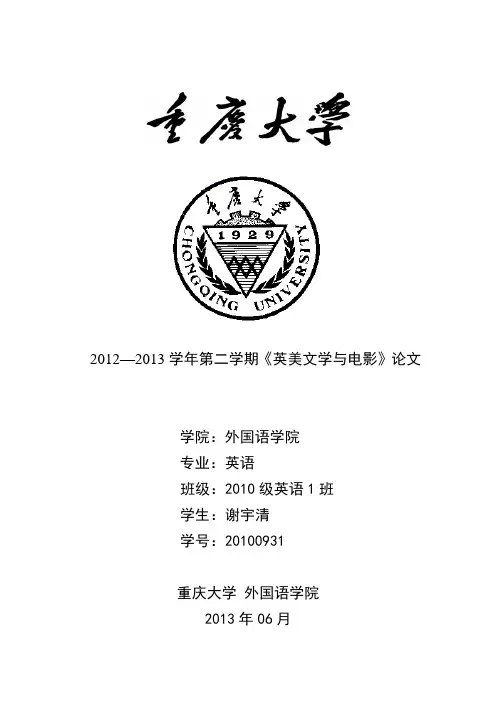
2012—2013学年第二学期《英美文学与电影》论文学院:外国语学院专业:英语班级:2010级英语1班学生:谢宇清学号:20100931重庆大学外国语学院2013年06月《断背山》小说与电影人物性格的差别摘要:由李安导演执导、改编自安妮·普露同名短篇小说的同性电影《断背山》形成一阵席卷全球的“飓风”,不仅在票房上获得巨大的商业成功,取得奥斯卡金像奖八项提名和三项大奖,并且对学术、时装和乡村音乐等不同文化领域产生了广泛个影响,在社会上掀起了对同性之爱的大讨论。
影片中唯美的西部风光和两个主角之间跨越性别但却深厚的爱情令人印象深刻,但两人厮守终身的愿望因主角杰克的意外死亡而破产不禁令人惋惜。
该影片题材“尖锐”,李安导演以东方人特有的细腻情感讲述了这个耐人寻味、令人惋惜的悲剧爱情故事。
本文将主要对比分析两个男主角在小说与电影中所塑造人物性格的不同,从而也导致了小说与电影对两个主角最后没有在一起的主要原因给了不同的理解:小说倾向于暗示是当时社会对同性恋的极端不容忍造成了两人最后的悲剧;而电影更倾向于是两人性格上的差异最终使得他们以悲剧收场。
关键词:同性恋埃尼斯杰克性格悲剧上个世纪90年代的某一天,安妮·普露走进怀俄明州的一个小酒馆。
她准备以西部风光为故事背景写一部长篇小说,小说要讲述的将是一段奇特的爱情。
酒馆里的一个男子引起了她的注意,他不像其他男人那样盯着漂亮的女人,而是非常紧张地看着一群正在玩游戏的年轻小伙子。
“也许他认识他们中的某一个人,或者他的儿子在那里,但是他的眼神让我在那一刻猜想——他是不是一个同性恋者?”安妮后来回忆说。
从那时候起,安妮开始考虑这样一个问题:一个有同性恋倾向的孩子生活在40、50或者60年代的怀俄明州会是一种什么状况?在当时的怀俄明州,同性恋是遭人唾弃的。
一个同性恋者要和社会抗争,和被社会改造过的自身抗争,这将是一件非常艰难痛苦的事情。
Brokeback Mountain, 《断背山》是2005年由中国导演李安执导的美国同性恋片,改编自安妮·普露的同名短篇小说《断背山》,由好莱坞著名影星杰克·吉伦哈布、希斯·莱杰和安妮·海瑟薇倾情出演。
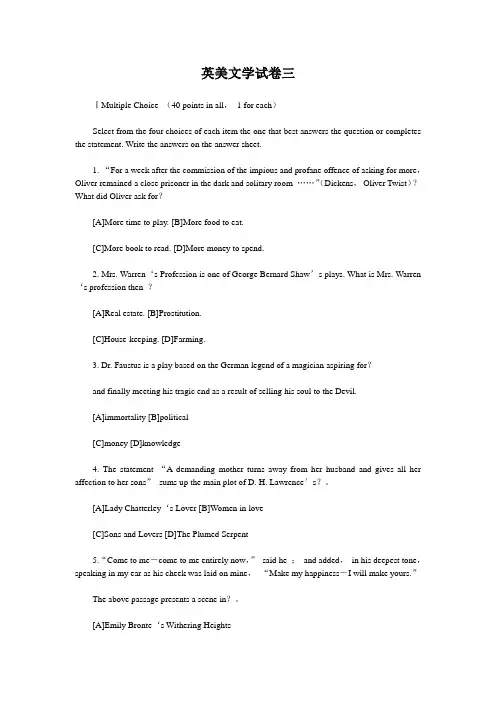
英美文学试卷三ⅠMultiple Choice (40 points in all,1 for each)Select from the four choices of each item the one that best answers the question or completes the statement. Write the answers on the answer sheet.1. “For a week after the commission of the impious and profane offence of asking for more,Oliver remained a close prisoner in the dark and solitary room ……”(Dickens,Oliver Twist)?What did Oliver ask for?[A]More time to play. [B]More food to eat.[C]More book to read. [D]More money to spend.2. Mrs. Warren‘s Profession is one of George Bernard Shaw’s plays. What is Mrs. Warren ‘s profession then ?[A]Real estate. [B]Prostitution.[C]House-keeping. [D]Farming.3. Dr. Faustus is a play based on the German legend of a magician aspiring for?and finally meeting his tragic end as a result of selling his soul to the Devil.[A]immortality [B]political[C]money [D]knowledge4. The statement “A demanding mother turns away from her husband and gives all her affection to her sons”sums up the main plot of D. H. Lawrence′s?。
《简·爱》名著与电影赏析姓名: 闫法轲学校:中原工学院信息商务学院专业: 会计班级: Z会计121学号: 201204013120一.作品综述1.作者简介:夏洛蒂·勃朗特(Charlotte Bronte,1816-1855)1816年生于英国北部约克郡的豪渥斯的一个乡村牧师家庭。
母亲早逝,八岁的夏洛蒂被送进一所专收神职人员孤女的慈善性机构——柯文桥女子寄宿学校。
在那里,她的两个姐姐玛丽亚和伊丽莎白因染上肺病而先后死去。
于是夏洛蒂和妹妹艾米莉回到家乡,15岁时她进了伍勒小姐办的学校读书,几年后又在这个学校当老师。
后来她曾作家庭教师,最终她投身于文学创作的道路。
夏洛蒂·勃朗特有两个姐姐、两个妹妹和一个弟弟。
两个妹妹,即艾米莉·勃朗特和安恩·勃朗特,也是著名作家,因而在英国文学史上常有“勃朗特三姐妹”之称。
1847年,夏洛蒂·勃朗特出版著名的长篇小说《简·爱》,轰动文坛。
1848年秋到1849年她的弟弟和两个妹妹相继去世。
在死亡的阴影和困惑下,她坚持完成了《谢利》一书,寄托了她对妹妹艾米莉的哀思,并描写了英国早期自发的工人运动。
她另有作品《维莱特》(1853)和《教师》(1857),其中《维莱特》可以看做是她个人的小说体自传,与她的人生经历十分相似。
这两部作品均根据其本人生活经历写成。
夏洛蒂·勃朗特善于以抒情的笔法描写自然景物,作品具有浓厚的感情色彩。
这位天生体弱的女作家是十九世纪英国文坛上一颗璀璨的明珠。
2.主要情节概述:这本小说是一部具有浓厚浪漫主义色彩的现实主义小说。
主要描写了简·爱的一系列遭遇以及与罗切斯特的爱情经历。
主人公简·爱是一个心地纯洁、善于思考的女性,她生活在社会底层,受尽磨难。
但是她有倔强的性格和勇于追求平等幸福的精神。
小说以浓郁抒情的笔法和深刻细腻的心理描写,引人入胜地展示了男女主人公曲折起伏的爱情经历,歌颂了摆脱一切旧习俗和偏见。
Charles DickensCharles Dickens was one of the great figures in English literature and has maintained his popularity to the present day because of his breadth of appeal. Many of the characters he created have since passed into a sort of modern mythology while many of his quotations have become part of everyday language. His works have been translated into practically every language and his novels have been adapted to plays, films, musicals, and so on.Charles Dickens was one of the most popular writers of his day as well. His unique blend of humour, pathos and humanitarianism resounds throughout all his works, and made him wildly popular in his time. Over the years he has received his fair share of praise, and today he is generally regarded as a serious literary artist as well as a social analyst. His depiction of Victorian society as being industrialized, greedy, and self important has earned his a seat among the great morally and socially responsible writers of history.Charles Dickens was born at Portsea on February 7, 1812. His father was a clerk in the Navy Pay Office and his mother was of middle class origin. Dickens's earliest years were happy ones. He was considered a delicate and imaginative boy, and spent much of his time wandering along the country of the Thames and Medway estuaries. Indeed, this countryside was later to become the setting of many scenes in his novels. He read Shakespeare, the Arabian Nights, and many 18th Century novels he had found in his attic. At school he was a quick learner and easily distinguished himself.In 1822 the Dickens family relocated to London after his father was transferred there. Charles had been left in Chatham to finish his school term and later joined his family. When he arrived he found them living in poverty. His father had run into financial difficulty, and now there was to be no more schooling for Charles, only household chores. Now he roamed the London streets, instead of the Thames and Medway estuaries. In February 1824 his father was arrested for debts and taken to Marshalsea prison. Twelve year old Charles was now sent to work in a blacking warehouse for a wage of six shillings a week to support himself, as the rest of theDickens family had relocated in the Marshalsea. His father was released in May 1824, but let Charles continue working for a few weeks more.It was these months of humiliation and despair that were to have a profound impact on Charles Dickens. It was this experience that provided him with the relentless drive he was known for, and it was this experience that inspired the creation of the suffering children and victims of injustice so often found in his books.Dickens studied for a few more years at Wellington House Academy, and then at age fifteen he became an office boy at the law firm of Ellis and Blackmore. Increasingly dissatisfied with this dull work, he eventually turned to journalism. By 1832 he was general reporter for the True Sun and also parliamentary reporter for his uncle's newspaper, the Mirror of Parliament. He also began writing fictional stories for London magazines. These stories attracted attention and in February 1836 a two volume collection was published named Sketches By Boz.At the same time Dickens's first novel, Pickwick Papers (1836-1837) was being written. This coincided with his marriage to Catherine Hogarth. Catherine bore him ten children in fifteen years, but their relationship eventually deteriorated and they seperated in 1858.In the meantime, Pickwick Papers brought Charles Dickens fame. In the next eight years he produced five more novels, miscellaneous stories, and several Christmas books, most notable of which was A Christmas Carol, which was published in 1843 and quickly became one of the world's classics. His many books on various themes earned Dickens a reputation as a social reformer. His public, which he had once made laugh, he now made cry, especially with the death of little Nell in The Old Curiosity Shop. The character of Nell was based on his sister-in-law, Mary Hogarth, who at age seventeen took ill and died in Dickens's arms. This sad memory was to haunt him till the end of his days.By 1849 Dickens had slowed in writing, but was reaching the peak of his creative powers. Between 1849-1850 he wrote his most autobiographical novel, David Copperfield. This was followed by Bleak House (1852-1853), Hard Times (1854), and Little Dorrit (1855-1857). In Little Dorrit there is a fusion of the autobiographical andsocial criticism, as the Marshalsea debtors' prison is displayed as a symbol of England's condition. This was followed by A Tale Of Two Cities (1859) and Great Expectations (1860-1861).These later novels showed a Dickens who was more somber than before. This was partly a result of social disillusionment and partly of personal and domestic circumstances. Despite his literary successes, Dickens was not a happy man. His marriage was falling apart and in the spring of 1859 he and his wife separated. The immediate reason for the breakup was Dickens's growing attraction to the young actress Ellen Lawless Ternan.Charles Dickens spent the last decade of his life in increased personal unhappiness and failing health. He gained no real happiness from his relationship with Ellen Ternan. Moreover, his sons, given all the advantages he lacked, were not turning out as well as he had hoped. One or two of them apparently had inherited their grandfather's attitude towards money and it seemed they were destined for useless lives much in the manner of the early Pip in Great Expectations.From 1858 onward, Dickens spent much of his energy giving a series of public readings from his own works. They were extremely successful, and in 1867, despite poor health, he visited the United States where his performances were a great success as well. He left the United States in April 1868 in irreparably poor health. He continued to push himself, and was halfway through his last novel, The Mystery of Edwin Drood, when he had a stroke and died, at Glad's Hill, on June 9, 1870. He was buried five days later in Westminster Abbey.。